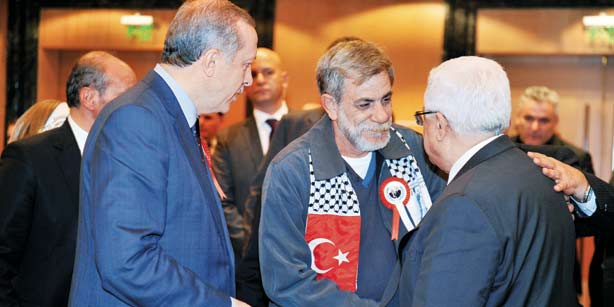
Palestinian President Mahmoud Abbas on Wednesday said his country is coordinating with Turkey to develop a legal strategy for the newly recognized UN-observer state of Palestine to challenge Israel’s increased settlement activity in the Occupied Territories, especially against those that will cut off East Jerusalem from the West Bank.
“We have come to an agreement with the Turkish government on two points: One is to establish close coordination with Turkish permanent representation at the UN with our UN representation in New York and the other is to have Turkish Foreign Ministry experts provide legal counsel to our side,” he told a group of reporters in Ankara.
Describing Israeli settlement activity in the Palestinian territories, especially the newly announced projects in the E-1 area, as a red line, Abbas said, “We have now new means at our disposal as a recognized state,” thought he did not lay out details on what steps his government may take.
Abbas acknowledged that even many Palestinians were less than optimistic about their country’s chances leading up to the vote in the UN General Assembly. “But thanks to Turkish efforts, we received huge support from the UN,” he said, adding that his first official visit to Turkey after the UN vote was meant to express the thanks of the Palestinian people to Turkey.
Turkey, one of the staunchest supporters of Palestinian efforts for statehood, helped the Palestinians in their lobbying attempts to upgrade the Palestinian Authority’s (PA) observer status at the world body from “entity” to “non-member state.”
The Palestinian Authority’s status at the UN was upgraded with a 138-to-9 vote at the 193-member UN General Assembly on Nov. 29. Despite intense US and Israeli diplomatic efforts in opposition to the proposal, it was voted against only by Canada, EU-member Czech Republic and five other countries, in addition to the US and Israel.
He added that the Fourth Geneva Convention now applies in the Occupied Territories, meaning that new legal remedies are at the disposal of Palestine, though he reaffirmed the commitment to solving this issue through negotiations with Israel if possible. He warned the Israeli government that Palestine will use international law to halt settlements being built on Palestinian territory.
“We acquired many rights when we were recognized as a non-member state by the UN. But in fact we will not eagerly consult international courts if Israel agrees to and complies with a peace agreement,” Abbas maintained.
Angered by the UN General Assembly’s de facto recognition of Palestinian statehood on Nov. 29, Israel announced the next day that it would build new dwellings for settlers on land near Jerusalem that Palestinians see as part of a future state.
The decision by Prime Minister Benjamin Netanyahu’s pro-settler government to build houses in the E-1 area for the first time raised alarm among Palestinians and in world capitals. Turkey has also described the new step as “more dangerous,” saying that it is aimed at cutting links between the Palestinians in Jerusalem and those in the West Bank.
Abbas also said he discussed monetary assistance to Palestine with ErdoÄŸan, whom he described as very sympathetic to the Palestinian cause. “He knew all the details about Palestine and we have discussed ways to help Palestine in the face of punitive sanctions by Israel and the US,” he explained. He recalled that the Arab League has set up a monitoring committee headed by Qatar on what assistance would be provided to Palestine in case funds were cut off by Israel and the US in the wake of recognition at the UN Assembly.
He also underlined that his government puts a priority on reconciliation among Palestinian groups. “Khaled Meshaal called me half an hour before I arrived [in Turkey] and we discussed reconciliation steps,” he revealed during the meeting. He said Hamas is ready to pursue talks with the PA under Egyptian mediation after the group’s ongoing internal elections.









